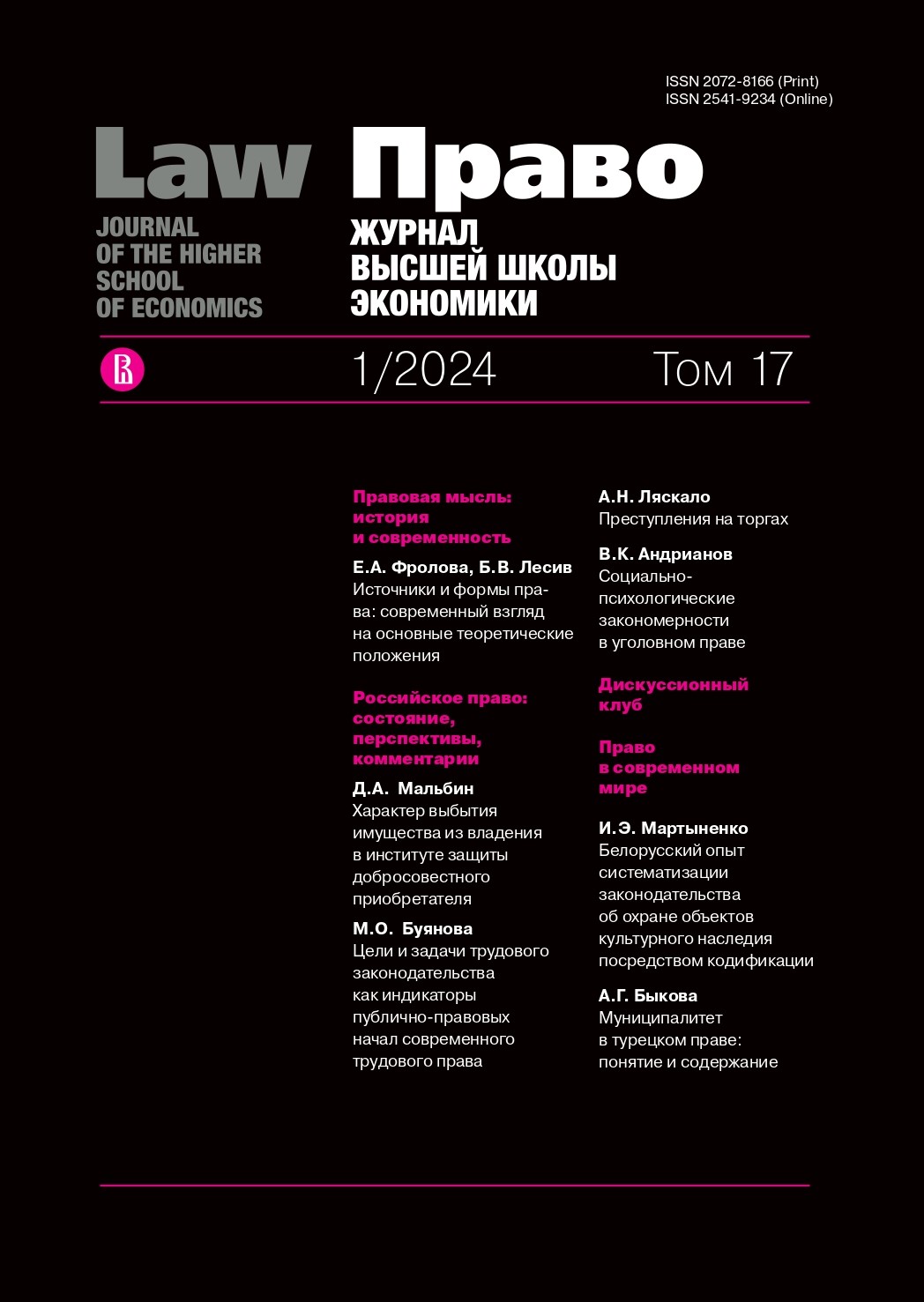Sources and Forms of Law: a Modern View on Basic Theoretical Provisions
Abstract
The positivist tendency in the Russian legal theory influenced the ratio between sources and forms of law. When the law is viewed solely from the point of state law-making monopoly, then the concept of sources of law is directly depended on the forms of state legal activity. Person appeals to the content of the latter if he or she wants to know what is due and permissible, naturally calling such forms as sources of law. Thus, the tradition to study law just as the product given by the state has formed the habit of equating the meanings of sources and forms of law. However, this approach leaves out the question of what factors prompt and accompany the process of lawmaking, as they precede a state sanction to adopt the law. Given that such factors lead to the creation of law exactly, not other social regulators, the authors propose a thesis that there is no sufficient ground to exclude them from the focus of jurisprudence as social science. This thesis is based on the observation that, as a result of mentioned exclusion, a significant part of social life, which is directly related to law-making and influences a content of legal norms, remains out of the lawyers’ competent survey. Such restricted view does not contribute to comprehensive mastery of the subject of the legal profession. Noteworthy is the fact that there is another approach also known to Russian jurisprudence, which had been substantiated by authoritative pre–revolutionary jurists. Among them were professors of leading legal schools G.F. Shershenevich (Moscow University), N.M. Korkunov (Saint Petersburg University), I.V. Mikhailovsky (Tomsk University). The study synthesizes their achievements on the correlation of sources and forms of law with relevant experience of legal history and comparative law, as well collates them with the realities of legal practice. It has been assumed that sources of law are reason, experience, faith, as well as composite categories and principles of law. On the contrary, normative acts, precedents, legal customs, normative treaties, legal doctrine has been studied as the forms of law. As a result, three main objectives has been accomplished: first, an alternative ratio between the concepts of sources and forms of law, that does not imply their equation, has been substantiated; secondly, authors have demonstrated that simplified understanding of the sources of law as some abstract categories (i.e. general will) does not always reflect the processes in the legal system; thirdly, authors have generalized the features and qualities of the basic forms of law revealing their theoretical advantages and disadvantages and updating common theoretical provisions against modern legal practice. One of the major conclusions is that the formal qualification of a legal act as a form of law (solely by external trappings without a meaningful analysis of its substantive features and qualities) is ineffective.
References
Aubakirova I.U., Berezhnov A.A. et al. (2022) Law, Order, Values. Moscow: BlockPrint, 688 p. (in Russ.)
Avila H. (2007) Theory of legal principles. Berlin: Springer, 168 p. DOI: https://doi.org/10.1007/978-1-4020-5879-0
Berzhel' J.-L. (2000) General theory of law. Moscow: NOTA BENE, 576 p. (in Russ.)
Boshno S.V. (2005) Form of law: a theoretical study. Doctor of Juridical Sciences Summary. Moscow, 48 p. (in Russ.)
David R. (1967) Basic contemporary legal systems. Moscow: Progress, 400 p. (In Russ.).
Gadzhiev G.A. (2008) Principles of law and law of principles. Sravnitel'noe konstitucionnoe obozrenie=Comparative Constitutional Review, no. 2, pp. 22-45 (in Russ.)
Gradovskiy A.D. (1880) Lectures on state law. Saint Petersburg: Stasulevich, 472 p. (in Russ.)
Gusev S.S., Karavaev E.F. et al. The Logic. Moscow: Prospect, 680 p. (in Russ.)
Hegel G. (1974) Encyclopedia of Philosophy. Vol. 1. Moscow: My'sl', 452 p. (in Russ.)
Holmes O. (1870) Codes and the arrangement of the law. The American Law Review, vol. 5, issue 1, pp. 1-13.
Jellinek G. (1903) General theory of the state. Saint Petersburg: Obschestvennaya pol'za, 532 p. (in Russ.)
Kokoshkin F.F. (1912) Lectures on the general theory of state law. Moscow: Bashmakov, 306 p. (in Russ.)
Korkunov N.M. Lectures on the general theory of law. Saint Petersburg: Martynov Printing, 364 p. (in Russ.)
Kulikov M.A. (2023) Manipulation by means of legal goals: concept and characteristics. Pravo. Zhurnal Vysshey shkoly ekonomiki=Law. Journal of the Higher School of Economics, vol. 16, no. 2, pp. 213-240 (in Russ.)
Mixailovskiy I.V. (1914) Essays on legal philosophy. Vol. 1. Tomsk: Posoknin Printing, 632 p. (in Russ.)
Posner R. (1998) Economic analysis of law. New York: Aspen, 1998. 802 p.
Pound R. (1941) The place of the judiciary. In: A Democratic Polity. American Bar Association Journal, vol. 27, no. 3, pp. 133-139.
Shershenevich G.F. (2016) Selected works. Vol. 4. Moscow: Statute, 496 p. (in Russ.)
Steilen M. (2011) The democratic common law. The Journal of Jurisprudence, no. 10, pp. 437-485.
Stoilov Ya. (2023) Principles of law: definition and implementation. Moscow: Prospect, 312 p. (in Russ.)
Copyright (c) 2024 Law Journal of the Higher School of Economics

This work is licensed under a Creative Commons Attribution-ShareAlike 4.0 International License.


















